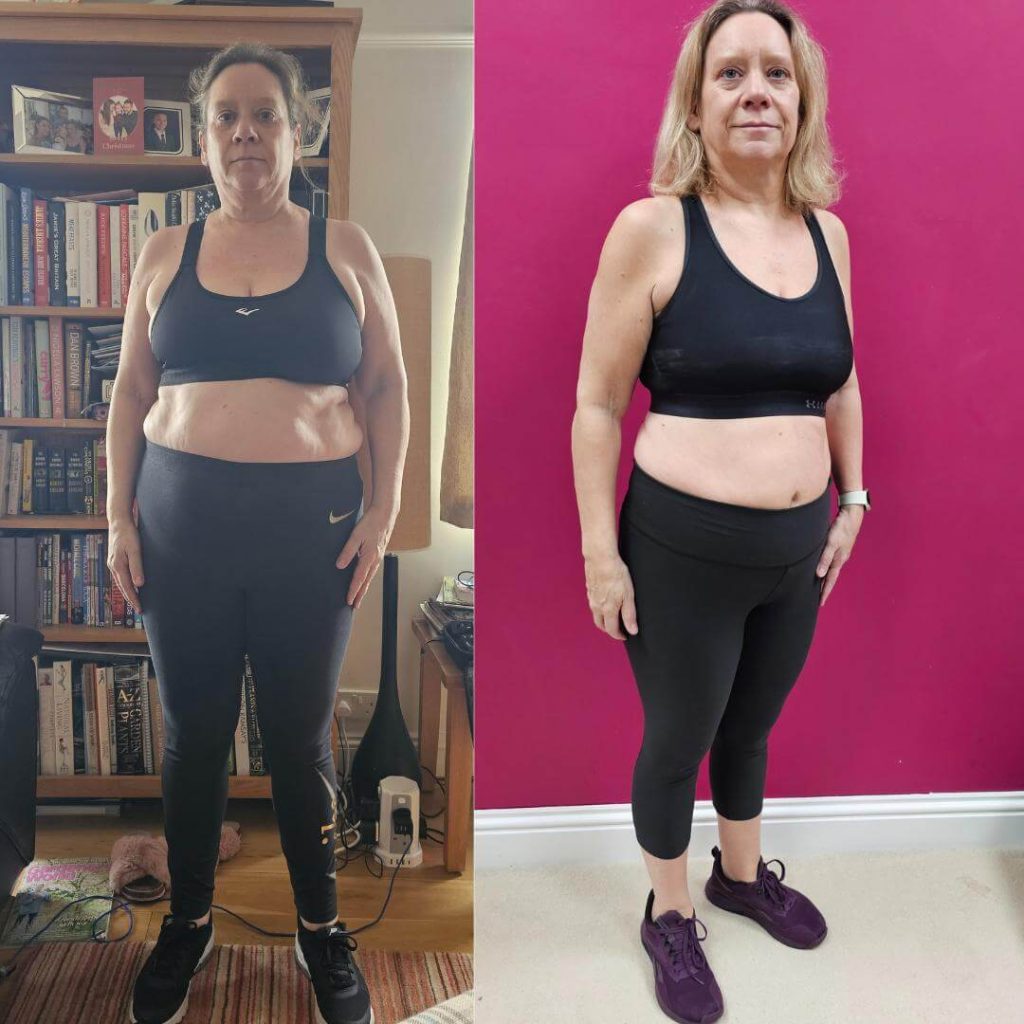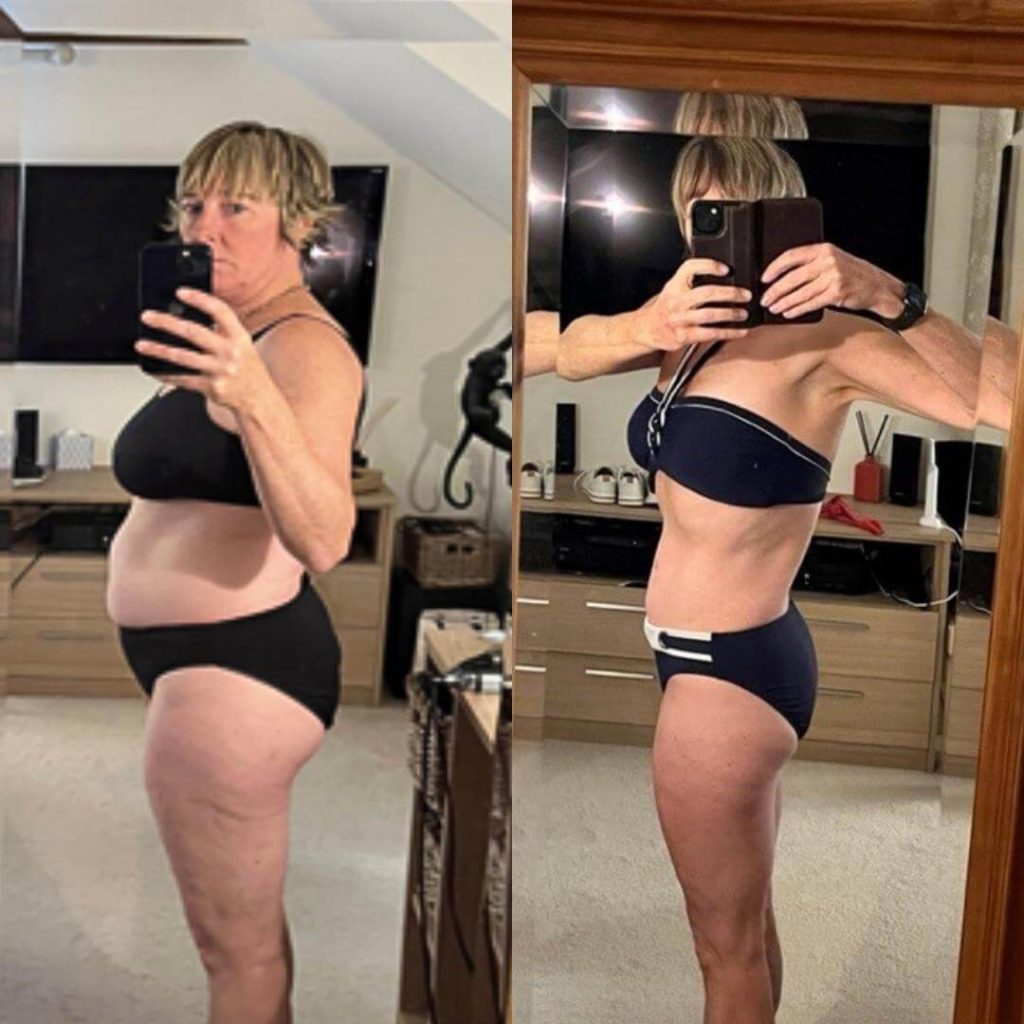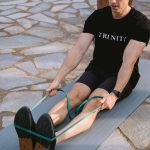If you’ve been wondering why your diet isn’t working, you’re not alone. So many women in their 40s, 50s and 60s go through the same cycle like cutting calories, skipping meals, trying juice cleanses, or following the latest “clean eating” trend.
At first, the weight might drop, but it quickly creeps back on and often with more fatigue, hunger, and frustration than before.
The problem is, during menopause, your body no longer responds to diets the way it used to. Hormonal changes slow your metabolism, affect how you store fat, and make it harder to maintain muscle, meaning that extreme diets or endless cardio can actually make things worse.
In this article, we’ll explore how to tell whether your current approach is helping or harming your progress, what warning signs to look out for, and what you can do instead to see results that last.

Why Your Diet Is Not Working Anymore
Most of the women we work with inside the Fit Over 40 programme tell a similar story. They’ve spent decades looking after everyone else like their children, partners, and work, and only now are they trying to focus on themselves again.
But when they return to the same “healthy habits” that worked in their 20s and 30s, their diet is not working the way it used to.
The reason is often to do with our biology. As oestrogen and progesterone begin to decline, your metabolism slows, your muscle mass naturally decreases, and your body becomes more sensitive to stress.
This combination can make traditional diet approaches not just ineffective but actively counterproductive.
If you’ve been following the same routines for months with little to no change in weight, energy, or how your clothes fit, that’s your first red flag: your diet might be harming your results rather than helping.

” Before Trinity I weighed 89kg and was in size 16 clothes, bordering on size 18. The most I have ever weighed, even when pregnant! I felt uncomfortably big and was always tired and lethargic with aches and pains in my hips and lower back. I tried different diets: Dukan diet worked temporarily and I lost significant amount of weight, but as soon as I reintroduced food types the weight piled back on and more each time. I tried Noom for a year and again the same thing happened. So, I gave up. Trinity has been a re-education in terms of my understanding of food and nutrition and exercise. In my 20s and 30s I was fit and strong, going to the gym regularly. I was trying to approach dieting and fitness in the same way I used to. It didn’t work. I am now 73kg, so in total I’ve lost 16kg since my pre-Trinity programme and officially joining. I feel fit and strong.”
– Paula Parker (55), Trinity Client
How to Know If Your Diet Is Harming Your Weight Loss
1. You’re eating less but feeling worse
Many women assume that eating less is always the answer, but chronic calorie restriction can backfire. Very-low-calorie diets may cause rapid weight loss at first, but most of that comes from water and muscle rather than fat.
Over time, this slows your metabolism, increases cravings, and leaves you feeling drained, foggy, and irritable. If you constantly feel exhausted, hungry, or achy despite eating “healthy,” your body might be in stress mode and holding on to fat rather than burning it.
2. You’re losing weight but not inches
If the scales go down but your body still feels soft or “flabby,” you’re likely losing muscle, not fat. This is a common problem with extreme diets and weight loss jabs that don’t include resistance training or enough protein.
Muscle is what keeps your metabolism strong, your body firm, and your bones healthy, especially during menopause. When muscle mass drops, fat loss becomes almost impossible to maintain, and you end up stuck in a frustrating cycle of regaining the same pounds.
3. You’ve cut out whole food groups (and joy)
Low-carb, ketogenic, vegan, or fasting diets can all “work” for a few weeks, but they rarely work long-term, especially for women over 40. When you cut out carbs or other food groups completely, your body initially loses water weight, not fat.
Then, once normal eating resumes, the weight creeps back on (often with interest). Even worse, cutting too much can increase stress hormones like cortisol, which blocks fat loss around the middle, exactly where many menopausal women struggle most.
If your diet leaves you anxious about meals, social events, or weekends away, it’s not working for you.
4. You’re focusing only on food, not lifestyle
Many women tell us they’re “doing everything right” with their diet but still can’t see results. That’s often because they’re tackling the wrong problem.
Around menopause, stress, sleep, and hormonal balance are just as important as what’s on your plate.
High stress or poor sleep can elevate cortisol and insulin, which encourage your body to store fat even if your calories are low. If your diet doesn’t take your whole lifestyle into account, it’s missing the bigger picture.
5. You’re doing lots of cardio but no strength training
Exercise is vital, but it’s not just about burning calories. Endless cardio sessions like running or cycling can raise stress hormones and increase hunger, which sabotages your diet efforts.
For women in menopause, the most effective approach is strength training combined with hormonally balanced nutrition. This helps rebuild muscle, boost metabolism, and reshape your body far more effectively than dieting alone.

“I was 10 stone 4 when I started my Trinity journey, I was wearing clothes that I could hide behind and didn’t know how or what to do to improve the situation. Before Trinity I used to think dieting meant leaving certain foods out of your diet and feeling hungry most of the time! I know a lot more about nutrition now and make sure I am eating the right sort of food the majority of the time. Cutting out WADS during the first few weeks helped me to feel less bloated and sluggish straight away. I have lost over 2 stone, something which I never thought possible. I joined Trinity as a last ditch attempt to make a change, never thinking it would work this well, but I am so pleased with the results and very proud of myself.”
– Tracy White (49), Trinity Client
So, What Type of Diet Actually Works in Menopause?
After working with more than 7,000 women, we’ve seen that long-term, sustainable results never come from extreme restriction. They come from balance.
At Trinity, we use a method called Hormonally Balanced Eating, which is designed specifically for women over 40. It’s built around giving your body the right amount of the three key nutrients it needs to function optimally: calories, protein, and fibre.
1. The Diet Makeover: Reset Your Body
The first step we usually recommend is what we call the Diet Makeover. This is a short-term reset that helps your body find balance again by removing four common problem food groups that tend to cause havoc around menopause: wheat, alcohol, dairy, and sugar. We call these the WADS foods.
These foods are easy to overconsume and they’re highly calorie-dense, addictive, and disruptive to your hormones and gut microbiome. The more you have, the more you crave, creating a cycle that makes weight loss much harder.
Try cut these foods out for one to two weeks, Once your body has had that reset, aim to avoid these foods around 80% of the time going forward. This balance allows you to enjoy life without slipping back into old habits.
Many clients notice rapid changes within days like better energy, clearer skin, reduced bloating, improved sleep, and steady progress on the scales.
2. Optimise for the Key 3: Calories, Protein, and Fibre
After the Diet Makeover, the next step is mastering the Key 3, these are calories, protein, and fibre. Getting these right helps balance hormones, reduce cravings, and make fat loss in menopause far easier.
Calories: Eat Smarter, Not Less
Metabolism slows by about 10% per decade, meaning your body may need several hundred fewer calories in your 40s and 50s than it did in your 20s. You should be prioritising nutrient-dense foods that keep you full and energised.
Base meals around lean proteins, vegetables, and whole foods, and cut back on ultra-processed snacks that spike blood sugar and increase hunger. Strength training also boosts your metabolism by helping you build muscle, which burns more calories even at rest.
Protein: Build and Maintain Muscle
Declining oestrogen makes it harder to hold onto muscle, so protein becomes crucial for maintaining strength, bone density, and a healthy metabolism. It also helps control hunger by keeping you fuller for longer.
Aim for about 30g of protein per meal and build meals around it, for example, Greek yoghurt with seeds and berries, a chicken or tofu stir fry, or beef chilli with vegetables.
Fibre: Stay Full and Support Hormones
Fibre slows digestion, balances blood sugar, and keeps your gut healthy and are all key for managing menopause symptoms and reducing cravings. Fill your plate with fibre-rich foods like vegetables, fruit, oats, legumes, and seeds.
The more variety, the better, try aim for around 30 different plants per week to keep your gut bacteria thriving and your appetite steady.

“My weight and dress sizes had been gradually creeping up for the past 10 years and before I started Trinity I was 11 stone and felt awful about how I’d let myself go. I’d also gotten into a daily routine with drinking after work, feeling that I deserved it after a stressful day. The diet makeover was a revelation, particularly cutting out wheat, dairy and alcohol – I forgot what it was like to feel healthy again with more energy and a lifted mood. ‘m now 10 kilos lighter, 3 dress sizes down, much stronger and have lost a total of 17 inches. I feel AMAZING. I’m able to enjoy most things and don’t feel deprived or hungry and would go as far as saying my outlook on life has totally changed. Trinity has been a gamechanger for me!”
– Sarah Hetreed (51), Trinity Client
Signs That Your Diet Is Actually Helping
You feel energised and satisfied
You should feel fuelled, not fatigued. If you’re eating enough protein and fibre, your meals will keep you full for longer and reduce cravings for sugar or processed snacks.
Your strength and mood are improving
A diet that supports muscle and hormone balance won’t just change your shape, it’ll lift your mood, improve sleep, and help you feel “like yourself” again.
You can enjoy life without guilt
A truly sustainable diet allows room for flexibility in meals out, holidays, and celebrations. When you stop labelling foods as “good” or “bad,” you build a healthy relationship with food that lasts.
The bottom line
Losing weight during menopause doesn’t mean starving yourself or cutting out all the foods you enjoy. It’s about giving your body what it needs to function properly again.
By resetting your system with the Diet Makeover, eating in line with the Key 3, and focusing on protein first, you can balance your hormones, boost your metabolism, and finally see lasting results—without endless restriction.
Watch How Rebecca Lost 3 Stone Without Extreme Dieting
How Trinity Can Help You Finally See Results
After helping over 7,000 women through our Fit Over 40 coaching programme, we’ve learned that it’s about understanding your body and hormones.
We’ve seen countless women who tried everything like Keto, Slimming Groups, low-carb, vegan, fasting, even weight loss jab, but nothing worked like it used to. They’d step on the scales after a week of “dieting” and see no change.
And when results don’t come, motivation disappears.
We don’t do quick fixes or meal plans you can’t stick to. Instead, we offer a complete lifestyle re-education tailored for women over 40, one that helps you:
- Balance your hormones naturally
- Build muscle and metabolism through targeted workouts
- Eat in a way that fits your life (no cutting out food groups)
- Drop 1–2 dress sizes in 12 weeks while feeling more confident, energetic, and strong
With a 97% success rate, our approach works because it’s built for you. You’ll get 1-to-1 support from expert coaches who guide you every step of the way so you never have to guess what’s right for your body again.




